Salford docks was the place where the Food Ships that fed the locked out workers and their families were loaded in 1913 so it was very appropriate for Salford University to host a major conference last Saturday (October 19th) on this seminal event in the labour history of these islands.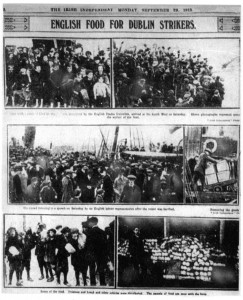
Click on link below for a guide to the proceedings and podcasts of all the speakers
http://www.quaysnews.net/Struggle_Solidarity_and_Defeat_The_1913_Dublin_Lockout_Centenary_Conference-11282.htm
Our thanks to Ralph Darlington and Siobhan Maguire for making these proceedings so readily available
Padraig Yeates on October 24, 2013 | Filed Under Uncategorized | Comments Off on Struggle, solidarity and defeat: The 1913 Dublin Lockout Centenary Conference in Salford
JAMES PLUNKETT AWARD FINAL
Wednesday 16th October saw a large turnout of guests for a glittering night at the Writers’ Centre. Friends and family of the nine finalists, who included our own members Barry Troy, Maureen Gallagher and Patrick McCusker, were joined by a large number of Union members.Final Draft October
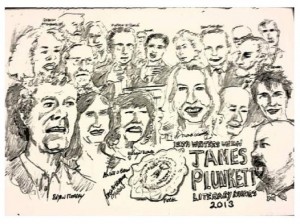
James Harpur Sketch at launch
Following three rounds of competition Noel O’Regan, “Hoax”; Eleanor O’Reilly, “Coagulated Blood and Dread”, Maureen Gallagher, “Apparition at Friars Hill”; Chris Dooley, “Bookworm”; Barry Troy, “In for a Penny”; and Patrick McCusker, “The Hill Farms Are Dying” were all hoping to reach the final three of the James Plunkett Short Story Award, but in the end it was Anne O’Brien with her story “I Could Have Been Anything” who claimed Third Prize; Fiona O’Connor and her story, “The Mystery of the Missing Finger and the Dead Cat” taking Second Prize and Eileen Keane was the overall winner with her story “The Peace of Evening”, earning her €2,000.
Sadly, Jennifer Johnston, who selected the three prize winners, could not be there on the evening and it was Irish Times’ Literary Editor Fintan O’Toole who presented the winners with their cheques, following his absorbing speech on James Plunkett and the importance of literature to Ireland’s culture.
After Anne, Fiona and Eileen had read their prize winning stories, actor Bryan Murray brought a lovely evening to a close with his magnificent reading of James Plunkett’s “Ferris Moore and the Earwig”.
Padraig Yeates on October 23, 2013 | Filed Under Uncategorized | Comments Off on Eileen Keane winner of James Plunkett Short Story Award
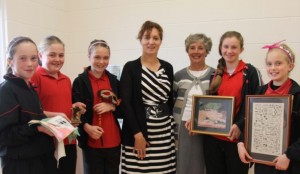
Mary O’Reilly, third from right with pupils at National School where she talked about making the Tapestry
History and art were linked in the best possible way at Timahoe NS recently thanks to the commemoration of the 1913 Lockout.
Always keen to bring every subject alive, school principal Ann Bergin was delighted to discover that Mary O’Reilly, the Great Aunt of a 5th class student, Niamh McKitrick, had been part of a group working on a commemorative tapestry which will be glazed and displayed in Liberty Hall, Dublin.
Under the direction of artists Robert Ballagh and Cathy Henderson, the visual narrative of the story of the 1913 Lockout was designed to include over 30 individual panels laid out in comic book style. Ms O’Reilly worked on the large centerpiece of the tapestry depicting Jim Larkin making a speech.
She was delighted to accept her grand-niece’s invitation to come to the school. While she was not in a position to bring the tapestry the children had been encouraged to go to see it at the National Ploughing Championships in Ratheniska. (more…)
Padraig Yeates on October 22, 2013 | Filed Under Uncategorized | Comments Off on One of lead Lockout Tapestry artists talks to students about how it was made
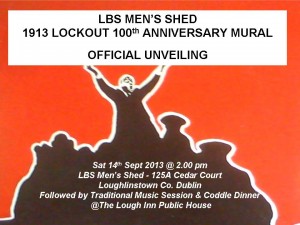
The James Plunkett Short Story Awards will take place at the Writers Centre in Parnell Square, Dublin, this evening (Wednesday October 16th). The prizes, provided by the Irish Congress of Trade Unions, are €2,000 for the winning entry, €1,000 for the second prize and €500 for the third. The competition has attracted hundreds of writers and shows the Irish Short Story is alive and well
Even more belated than the ss Hare but here is video of Jer O’Leary at unveiling of the Loughlinstown Mens Shed Lockout Mural on September 14th. For anyone unfamiliar with Ireland’s best known Larkin impersonator, Jer O’Leary, it is a rare treat
http://www.youtube.com/watch?v=fOMgnf76HeM&sns=em
We also have a song about one of the Lockout’s forgotten Martyrs, James Byrne, written and sung by Pat Burke of Goleen. Byrne’s death will be commemorated at Deans Grange Cemetery, County Dublin, at 2pm on November 2nd. The ICTU President John Douglas will give the oration
http://youtu.be/RcZx2yv04aE
Padraig Yeates on October 16, 2013 | Filed Under Uncategorized | Comments Off on Of Short Stories, and Speeches and a Song
Better late than never – the ss Hare arriving in Dublin. The video is as jumpy as a Hare if not as fast
http://www.youtube.com/watch?v=NJggsSf6EXk
Padraig Yeates on October 11, 2013 | Filed Under Uncategorized | Comments Off on ss Hare arriving in Dublin
There are three exhibitions that just opened at the National Museum of Ireland – Decorative Arts and History, Collins Barracks, Benburb Street, Dublin 7.
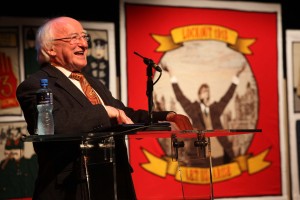
President Michael D Higgins at launch of Tapestry – this panel is one of many at Exhibition
They are:
1913 Lockout: Impact & Aftermath,
Banners Unfurled and
Lockout: The Tapestry
Opening Hours:
Tuesday – Saturday: 10am – 5pm
Sunday: 2pm – 5pm
Closed Mondays
Padraig Yeates on October 11, 2013 | Filed Under Uncategorized | Comments Off on Three Exhibitions in One at Collins Barracks, Dublin from Now until November 14th
“Hands Across the Water: 1913 -2013”
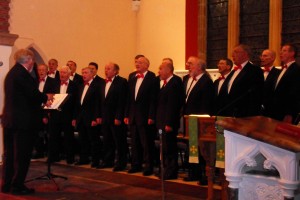
Côr Meibion Onllwyn – the Onllwyn Miners’ Male Voice Choir
Drogheda will resound again to the wonderful music of Côr Meibion Onllwyn – the Onllwyn Miners’ Male Voice Choir – on Friday next, 11th October when the South Wales choir will perform in the Augustinian Church, Shop Street at 8 p.m. Their first visit to Drogheda two years ago was a spectacular success and established many lasting links between the two communities. The event will be another link in the chain that has now been growing for exactly100 years.
In 1913 the South Wales Miners Federation sent £1,000 a week for fourteen weeks to support starving Dublin families during the 1913 Lock Out. This was an enormous sum of money in 1913. An attempt was made in 1984 to repay this historic debt when Irish trade unionists campaigned in solidarity against the ferocious attack by the British Government on the mining industry and mining communities.
In saying thank you for this solidarity the South Wales mining community first sent the choir to Ireland in 1986. All proceeds from the performances have gone to charity and as a result, many Irish charitable organisations have benefited greatly by such fundraising.
http://www.youtube.com/watch?v=JQoTFM5RW0M (more…)
Padraig Yeates on October 7, 2013 | Filed Under Uncategorized | Comments Off on Welsh Choir Returns to Ireland to Commemorate links with Lockout and Miners Strike – October 11th
Following three rounds of competition, the Irish Writers’ Union are pleased to announce the following have made the final shortlist of nine for the James Plunkett Short Story Award. 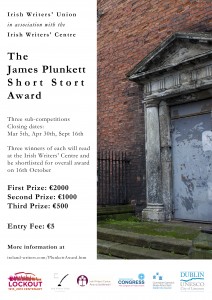
Noel O’Regan, “Hoax”
Fiona O’Connor, “The Mystery of the Missing Finger and the Dead Cat”
Maureen Gallagher, “Apparition at Friars Hill”
Eleanor O’Reilly, “Coagulated Blood and Dread”
Chris Dooley, “Bookworm”
Barry Troy, “In for a Penny”
Anne O’Brien, “I Could Have Been Anything, “
Patrick McCusker, “The Hill Farms Are Dying, “
Eileen Keane, “The Peace of Evening,
The final will take place in the Irish Writers’ Centre at 7:30 on 16th October. The winners will be selected by Jennifer Johnson. (more…)
Padraig Yeates on October 6, 2013 | Filed Under Uncategorized | Comments Off on Winner of James Plunkett Short Story Award to be announced on October 16th in Writers Union, Parnell Square, Dublin
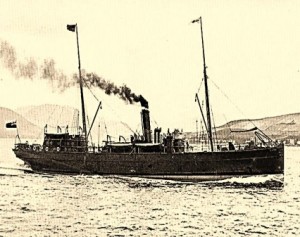
Original ss Hare
The Food Ships that saved Dublin families from Starvation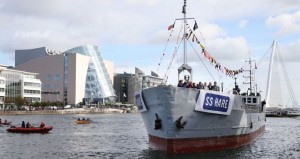
On September 27th, 1913, the ss Hare crossed the bar in Dublin and brought food for thousands of starving trade unionists and their families. It was the first of many voyages by the Hare and its sister vessels, the ss Pioneer and ss New Fraternity, that kept death at bay in the terrible winter of 1913-1914.
It has been said that the money could as easily have been sent over and paid out to the strikers instead. But Larkin wanted the workers and their families to see the power of collective action and there was no better way than watching the vessels come up the Liffey armed with food loaded at the British Co-Operative stores in Salford and brought down the Mersey Ship Canal to Liverpool before setting off across the Irish Sea. Besides, delivering food instead of money would ensure none of this aid was spent on drink.
The goods were stored in the Manchester Shed on Sir John Rogerson’s Quay throughout the Lockout. The last of the food was distributed in February 1914, as the men returned to work. Altogether the Parliamentary Committee of the Trades Union Congress collected £93,518. The amounts ranged from £1,000 a week provided by the Miners Federation to 10s from the stokers on the HMS Edinburgh. By late November 255,330 packets of tea had been shipped to Dublin, 255,000 bags of sugar, 255,330 packets of margarine, 597,000 loaves of bread, 251,804 bags of potatoes, 1,856 lb of Jacob’s Biscuits, 72,639 pots of jam, 85,330 tins of fish, 12,500 boxes of cheese and almost 885 tons of coal.
Click More for programme of Events (more…)
Padraig Yeates on October 4, 2013 | Filed Under Uncategorized | Comments Off on Food Ship Re-enactment today in Dublin Port
Dublin Festival of history
Lots of good stuff on Lockout and other subjects that are too many to be included on Events page. Lockout related items include:
Duel Personalities – Murphy versus Larkin in Dublin Castle on Sunday, September 39th with Barry McGovern, Bryan Murray and Padraig Yeates at 4pm and
Women, children and food provision in the 1913 Lockout with Ann Matthews in Charleville Mall Library on , Thursday 3rd October at 11am,
For more information on these and other events go to http://dublinfestivalofhistory.ie/
Padraig Yeates on September 27, 2013 | Filed Under Uncategorized | Comments Off on History Festival









